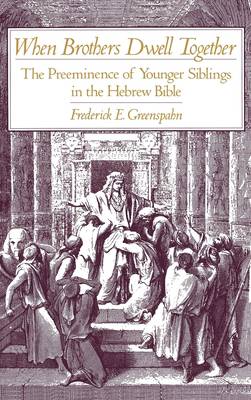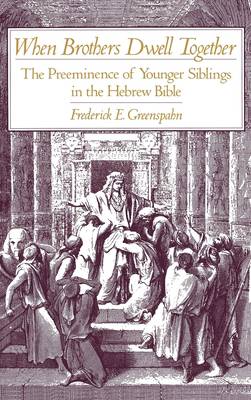
- Afhalen na 1 uur in een winkel met voorraad
- Gratis thuislevering in België vanaf € 30
- Ruim aanbod met 7 miljoen producten
- Afhalen na 1 uur in een winkel met voorraad
- Gratis thuislevering in België vanaf € 30
- Ruim aanbod met 7 miljoen producten
Zoeken
When Brothers Dwell Together
The Preeminence of Younger Siblings in the Hebrew Bible
Frederick E Greenspahn
Hardcover | Engels
€ 145,45
+ 290 punten
Omschrijving
Although primogeniture is commonly assumed to have prevailed throughout the world and firstborns are regarded as most likely to achieve success, many of the most prominent figures in biblical literature are younger offspring, including Isaac, Jacob, Joseph, Moses, Samuel, David, and Solomon. Adducing evidence from a wide range of disciplines, this study demonstrates that ancient Israelite fathers were free to choose their primary heirs. Rather than being either legally mandated or a protest against the prevailing norm, the Bible's propensity for younger offspring conforms to a widespread folk motif, evoking innocence, vulnerability, and destiny. Within the biblical context, this theme heightens God's role in supporting ostensibly unlikely heroes. Drawing on the resources of law, anthropology, folklore, and linguistics, Greenspahn shows how these tales serve as complex parables of God's relationship to his chosen people, also reflecting Israel's own discomfort with the contradiction between its theology of election and the reality of political weakness.
Specificaties
Betrokkenen
- Auteur(s):
- Uitgeverij:
Inhoud
- Aantal bladzijden:
- 208
- Taal:
- Engels
Eigenschappen
- Productcode (EAN):
- 9780195082531
- Verschijningsdatum:
- 24/02/1994
- Uitvoering:
- Hardcover
- Formaat:
- Genaaid
- Afmetingen:
- 161 mm x 244 mm
- Gewicht:
- 435 g

Alleen bij Standaard Boekhandel
+ 290 punten op je klantenkaart van Standaard Boekhandel
Beoordelingen
We publiceren alleen reviews die voldoen aan de voorwaarden voor reviews. Bekijk onze voorwaarden voor reviews.











